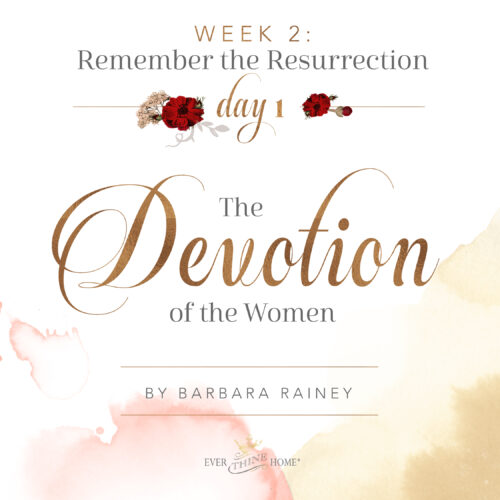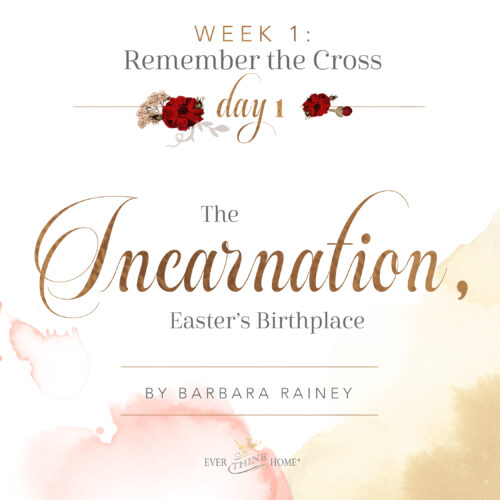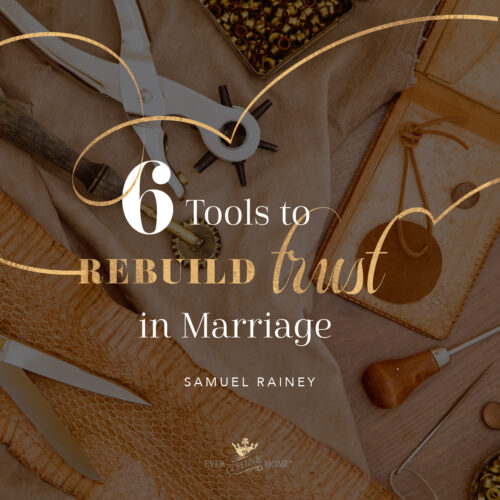
A Note from Barbara:
When my son Samuel shared this six-part series with our team, there was some vying for which website would run it first, Ever Thine Home or The Raineys. As you can see, Ever Thine Home won our little team debate!
I am so happy to share Samuel’s first marriage tool with all of you. Samuel does a great job laying out common issues most marriages face and some very practical ways to deal with them over the rest of this week. I also want to encourage you and your friends to subscribe to Barbara’s Friends and Family so you can read all six! Plus all my new content slated for this fall.
Remember you can always enjoy a free week trial to get a chance to read all six tools plus check out everything I’ve done this year for Barbara’s Friends and Family.
Introduction
I’ve broken many bones in my body, but there was a stretch of three consecutive years when I broke an arm. If you’ve ever broken a bone you know that the healing process is neither fun nor fast. It’s painful, it takes time, and it usually requires the help of others. Yet when the healing is done well, the place where the break occurred will usually become the strongest part of the bone.
The problem with an incorrect healing process is that when the bone heals without an external aid, it ends up healing incorrectly. This is why my left pointer finger is crooked: I didn’t seek help when I broke it while wrestling with my boys over 15 years ago.
Like the bones in our body, a relationship cannot stand without the bones of trust. Unfortunately these bones get broken, just like those in our body. It’s painful when breaks occur in a relationship. Sometimes the healing process feels more painful than the break itself.
Most relationship issues I encounter in my counseling office are a result of broken trust. Stories like infidelity, workaholism, addictions, lying, gambling, and many other life changing situations. How we handle money is another common story of broken trust, and that’s why Rashad and Susanna called me.
They sat down on opposite ends of the couch, turned off their phones, and stared at me. After a moment of waiting to see if either of them would talk about why they were here, I asked how I could be of help. Susanna quickly took the opportunity to speak and over the next few minutes described the ups and downs of their 13-year marriage. She described how great they do together when they’re on vacation or away from the everyday stressors of their three kids and two dogs.
All of what she was saying sounded like pretty common marriage challenges, but I had a sense that there was something bigger concerning them. She finished her recap and looked at Rashad. He sharply asked her if that was all that she was going to share. Looking somewhat defeated, she said that he could share the rest.
“She’s a shopaholic, and has been lying to me about money for years,” he said. “We’ve been dealing with this issue for our entire marriage. She keeps promising she’ll stop, and just last week I found another credit card with over $11,000 of charges. I just can’t trust her anymore.”
Over the years, Rashad and Susanna had met several times with their pastor on this issue. But the problem persisted. Rashad would say, “How can I trust her if she keeps doing it?” To which she would respond, “I promise that I won’t do it again!”
One of the most beautiful, yet difficult, realities as followers of Jesus is that we are called to forgive others. Ephesians 4:32 says this, “Be kind and compassionate to one another, forgiving each other, just as in Christ God forgave you” (NIV).
Forgiveness is really hard to give when the behaviors of the other person don’t seem to be changing. Rashad and Susanna kept showing up week after week, and after almost a year of working together they were able to reconcile in a way that neither of them had experienced before. From my seat, there were two reasons they had this new experience of forgiveness.
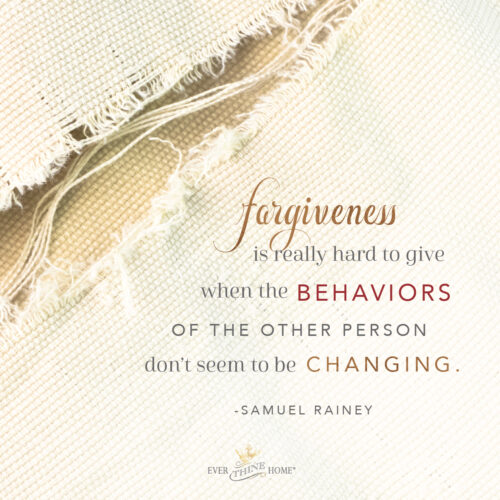
First, early on it became clear that Susanna’s way of coping with painful and stressful challenges in life was to shop. She realized that her shopping addiction started in college when her parents divorced and then declared bankruptcy. Identifying this helped Rashad to see that her lying and spending was not about her being a malicious person; she was reacting to a lot of pain. He found compassion for her, which helped to quiet his feelings of anger and resentment.
Second, Susanna worked really, really hard at following the plan we developed for rebuilding his trust. She didn’t do it perfectly. Yet over time she grew more able to get back on the plan. Rashad began to trust her more each day because he saw that she was truly putting in the work we had all agreed upon.
I heard a biblical scholar talk about how the Psalms follow a repetitive structure and process. There are Psalms of orientation, dis-orientation, and re-orientation. When tragedy happens in life, we get disoriented. Rebuilding trust in relationships is the process of reorientation. Discovering a new way to relate. So many people get caught up in trying to “get back to the way it used to be” thereby missing the opportunity to heal what’s been broken.
I’ve found that there are six specific tools that you need to rebuild trust. These tools can be done without the participation of the other person, they can be used on their own, or in the specific order I am going to lay them out.
The tools:
- Own your mistakes.
- Tell the truth.
- Delay gratification.
- Make amends.
- Follow through.
- Use your powers for good.
Each of these six tools are great to practice on their own. And you’ll probably experience growth in doing so. But combining all six together is like a trust-building super-tool. I’ve yet to see anyone utilize this super-tool and not find tremendous benefit in their life. When couples do this process together, it’s pretty amazing to see the transformation in their relationship.
Tool #1: Own Your Mistakes
“Why do you see the speck that is in your brother’s eye, but do not notice the log that is in your own eye? Or how can you say to your brother, ‘Let me take the speck out of your eye,’
when there is the log in your own eye? You hypocrite, first take the log out of your own eye, and then you will see clearly to take the speck out of your brother’s eye.”
~ Matthew 7:3-5 (NIV)
Owning your mistakes is the foundation upon which all the other tools rely on. It’s like learning how to do math—you first have to know the numbers before you can add and subtract.
Trust requires that you own your mistakes … admit them and take responsibility for them without blame. Without justification. Without explanation. Pure unadulterated ownership will breathe life and hope into a weary relationship.
This makes me wonder what Adam and Eve’s story would have looked like in Genesis chapter 3 had they owned up to their mistakes. After they sinned and ate of the forbidden fruit (verse 6) God finds them in the garden hiding and clothed in fig leaves (verse 9). He first addresses Adam and asks what happened (verse 11). Adam blames God and Eve for his sin, and only owns his mistake when Eve gives him the fruit (verse 12). Then God addresses Eve, and she follows Adam’s lead and blames the serpent for her mistake (verse 13).
I have no idea what God might have done if both of them were repentant and owned up to their sin. As a dad, I know that I still give consequences to my kids when they disobey, but it’s a far different relationship between us when they disobey and then take responsibility for their actions.
Perhaps Adam and Eve would have maintained a closer relationship with God had they not blamed and instead owned up to their actions. Regardless, their sin resulted in exile from the Garden of Eden and a new reality of pain and hardship because of their sin.
Like Adam and Eve, our inclination after a personal failure is to avoid responsibility, blame others, and shift the attention away from ourselves. This natural reaction breaks trust in others because they can’t rely on you to recognize and own the part you played in the failure.
One thing I’ve learned over the past 20 years working with people and their relationships: Everyone has light and darkness in them. This truth has been discussed in the Bible and by the great thinkers of every generation. Author and philosopher Alexander Solzhenitsyn said:
“The line separating good and evil passes not through states, nor between classes, nor between political parties either—but right through every human heart—and through all human hearts.”
The apostle Paul speaks to this truth in Romans 7 when he laments about doing what he hates and not doing what he wants to do (verse 15-20). We live by two laws: the law of the flesh (sin in us), and the law of God (Christ in us).
Owning your mistakes is shining a light on your darkness. This simple but difficult act proclaims that the story of Jesus conquering death and being raised to life is indeed true. That if Jesus came to be a light in the darkness (John 18:12), then it is our honor and privilege to participate with Him in allowing the light into the darkness. On the contrary, refusing to own your mistakes (blame, justification, ignoring, etc.) casts darkness over the light. This is the battle that you, me, and everyone on the planet is fighting.
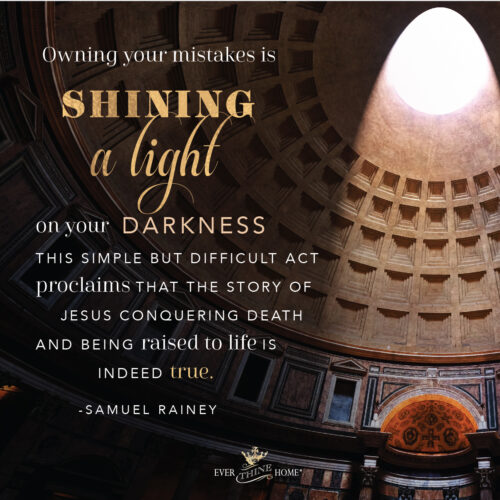
Step into the light. Take full responsibility for your actions as if they happened in a vacuum. For some amount of time, let your mistake be front and center in the relationship so that you can truly understand the impact your actions had on the other person.
Don’t try to explain the reasons for your failure. Don’t blame someone on why your mistake was not really your fault. Lastly, your intentions don’t matter (unless the other person, with curiosity, asks about why you did what you did).
Mastering the use of this tool will build your maturity. The benefit for others is that they will grow in their trust of your responsibility. They will know that you can and will handle the difficulties life brings your way. And when you mess up, they will trust you to own up to what you did. The cool benefit of this is that when you show yourself to be responsible as your primary action, grace and mercy are plentiful when mistakes happen.
Owning your mistakes …
Builds in you: Maturity
Helps others trust in your: Responsibility
Samuel Rainey, son of Barbara and Dennis Rainey, is a marriage and family therapist. He and his wife Stephanie have four kids.


